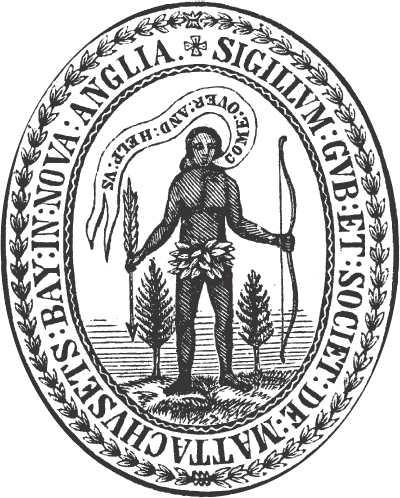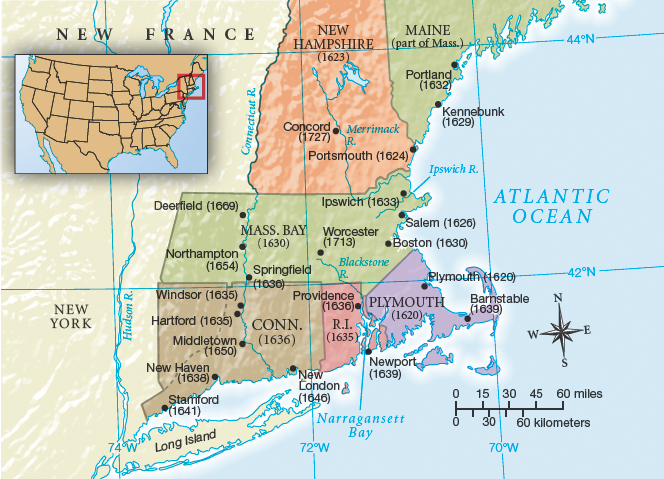4.2.3 The Founding of Massachusetts Bay Colony.
Printed Page 80 Chapter Chronology
The Founding of Massachusetts Bay Colony. In 1629, shortly before Charles I dissolved Parliament, a group of Puritans obtained a royal charter for the Massachusetts Bay Company. The charter provided the usual privileges granted to joint-stock companies, including land for colonization that spanned present-day Massachusetts, New Hampshire, Vermont, Maine, and upstate New York. A unique provision of the charter permitted the government of the Massachusetts Bay Company to be located in the colony rather than in England. This provision allowed Puritans to exchange their status as a harassed minority in England for self-government in Massachusetts.

To lead the emigrants, the Massachusetts Bay Company selected John Winthrop, a prosperous lawyer and landowner, to serve as governor. In March 1630, eleven ships crammed with seven hundred passengers sailed for Massachusetts; six more ships and another five hundred emigrants followed a few months later. Unlike the Separatists, Winthrop's Puritans aspired to reform the corrupt Church of England (rather than separate from it) by setting an example of godliness in the New World. Winthrop and a small group chose to settle on the peninsula that became Boston, and other settlers clustered at promising locations nearby (Map 4.1).
Map Activity 1 for Chapter 4

In a sermon to his companions aboard the Arbella while they were still at sea — probably the most famous sermon in American history — Winthrop proclaimed the cosmic significance of their journey. The Puritans had "entered into a covenant" with God to "work out our salvation under the power and purity of his holy ordinances," Winthrop declared. This sanctified agreement with God meant that the Puritans had to make "extraordinary" efforts to "bring into familiar and constant practice" religious principles that most people in England merely preached. To achieve their pious goals, the Puritans had to subordinate their individual interests to the common good. "We must be knit together in this work as one man," Winthrop preached. "We must delight in each other, make others' conditions our own, rejoice together, mourn together, labor and suffer together." The stakes could not be higher, Winthrop told his listeners: "We must consider that we shall be as a city upon a hill. The eyes of all people are upon us."
That belief shaped seventeenth-century New England as profoundly as tobacco shaped the Chesapeake. Winthrop's vision of a city on a hill fired the Puritans' fierce determination to keep their covenant and live according to God's laws, unlike the backsliders and compromisers who accommodated to the Church of England. Their resolve to adhere strictly to God's plan charged nearly every feature of life in seventeenth-century New England with a distinctive, high-voltage piety.
Unlike the early Chesapeake settlers, the first Massachusetts Bay colonists encountered few Indians because the local population had been almost entirely exterminated by an epidemic. And each year from 1630 to 1640, ship after ship followed in the wake of Winthrop's fleet, bringing more than twenty thousand new settlers.
Often, when the Church of England cracked down on a Puritan minister in England, he and many of his followers moved together to New England. By 1640, New England had one of the highest ratios of preachers to population in all of Christendom. Several ministers sought to carry the message of Christianity to the Indians and established "praying towns" to encourage Indians to adopt English ways. But the colonists focused far less on saving Indians' souls than on saving their own.
The occupations of New England immigrants reflected the social origins of English Puritans. On the whole, the immigrants came from the middle ranks of English society. The vast majority were either farmers or tradesmen. Indentured servants, whose numbers dominated the Chesapeake settlers, accounted for only about a fifth of those headed for New England. Most New England immigrants paid their way to Massachusetts. They were encouraged by the promise of bounty in New England reported in Winthrop's letter to his son: "Here can be no want of anything to those who bring means to raise [it] out of the earth and sea."
In contrast to Chesapeake newcomers, New England immigrants usually arrived as families. In fact, more Puritans came with family members than did any other group of immigrants in all of American history. Unlike immigrants to the Chesapeake, women and children made up a solid majority in New England.
As Winthrop reminded the first settlers in his Arbella sermon, each family was a "little commonwealth" that mirrored the hierarchy among all God's creatures. Just as humankind was subordinate to God, so young people were subordinate to their elders, children to their parents, and wives to their husbands. The immigrants' family ties reinforced their religious beliefs with the interlocking institutions of family, church, and community.